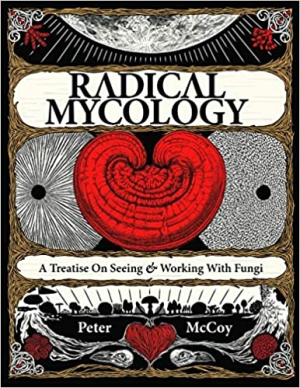
Radical Mycology
A Treatise on Seeing & Working with Fungi
Radical Mycology lays down a solid base of mycological knowledge, amped up by Peter McCoy’s passion for fungi, sharing information, and social change.
Fungi are some of the most ubiquitous and environmentally important living organisms; they are also some of the least understood and researched. In his comprehensive, illustrated treatise, Radical Mycology, Peter McCoy delves into myriad scientific and cultural disciplines, fleshing out what is known and yet to be discovered about fungi and their central role in the web of life.
Fungi are often thought of as plants, but McCoy clarifies that they are Myceteae, taxonomically one of the five major kingdoms. Fungi include mushrooms (which are the fruiting bodies of various fungus species), yeasts, and the symbiotic colonies of fungi and algae known as lichens. The book relays much intriguing information about hardworking fungi, from the fact that humans share 80-85% of their ribosomal DNA with fungi, to fungi’s integral role in building soil, including that fungi are responsible for 90% of all decomposition.
Underscoring the richness of the subject material is its extended metaphor of viewing life and tackling problems “through a mycelial lens.” The sustained message is that fungi are careful stewards of Earth’s resources, and that they impart lessons about resilience and sustainability that people would do well to emulate. Radical mycology, as a practice, involves philosophical and applied methods of public education, community building, and figuring out alternative systems to slow or reduce harmful effects on the environment.
Thorough discussions of fungal life cycles and structures are included, as is fungi identification and a note on the importance of mycorrhizae, or fine, fast-growing fungal root filaments that share water and nutrients with a wide range of plants. The book also covers ways to harness fungi power to enhance food crops and remediate polluted landscapes. DIYers, citizen scientists, home brewers, homesteaders, and social activists can choose from a large number of fungi projects, all introduced with enthusiasm that extends to advice on how to affordably buy and make one’s own gear and tools.
Esoteric mycological topics are covered in essays by other writers, including alchemy, how to develop educational activities for children, and visual healing exercises. The book devotes a balanced chapter to psychoactive mushrooms, outlining their biochemistry, effects on the brain, social history, and taboos across cultures and eras. Extensive resource lists, endnotes, appendices, and a robust bibliography are included to help with further exploration, as are the book’s edifying and interesting sidebar quotes, factoids, lists, illustrations, and photographs.
Radical Mycology is an stimulating, exciting introduction to fungi that’s full of data, ideas, and practical projects.
Reviewed by
Rachel Jagareski
Disclosure: This article is not an endorsement, but a review. The publisher of this book provided free copies of the book and paid a small fee to have their book reviewed by a professional reviewer. Foreword Reviews and Clarion Reviews make no guarantee that the publisher will receive a positive review. Foreword Magazine, Inc. is disclosing this in accordance with the Federal Trade Commission’s 16 CFR, Part 255.
